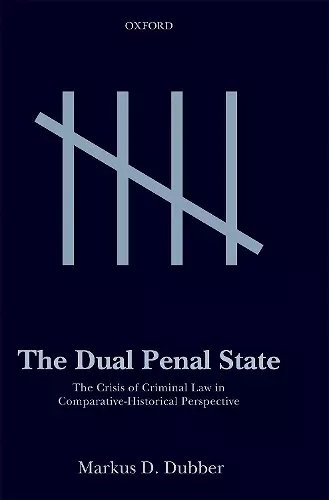The Dual Penal State
The Crisis of Criminal Law in Comparative-Historical Perspective
Format:Paperback
Publisher:Oxford University Press
Published:21st Jan '21
Should be back in stock very soon
This paperback is available in another edition too:
- Hardback£99.00(9780198744290)

In The Dual Penal State, Markus Dubber addresses the rampant use of penal power in Western liberal democracies. The interference with the autonomy of the very persons upon whose autonomy the legitimacy of state power is supposed to rest is systemically normalized, rather than continuously scrutinized. The fundamental challenge of the penal paradox-the prima facie illegitimacy of modern punishment-remains unaddressed and unresolved. Focusing on the United States and Germany, and drawing on his influential account of the patriarchal origins of police power, Dubber exposes the persistence of a two-sided criminal justice regime: the dual penal state. The dual penal state combines principled punishment of equals under the rule of law, on one side, with punitive discipline of others under the rule of police, on the other. Slavery has long played a central role in drawing the line between the two sides of the dual penal state. In Europe, the slave appears in the classic and still foundational accounts of liberal punishment (from Beccaria to Kant) as the paradigmatic other beyond the protection of law, not a legal subject but a mere object of the master's or the state's discretionary discipline. In America, the patriarchal power to police portrays the continuum from the antebellum slaveholder's whipping of his slaves in private and the racial terror perpetrated by slave patrols in public, to the apartheid regime of Jim Crow and the treatment of prisoners as "slaves of the state," and eventually to the late 20th century's systemic racial violence of the “war on crime" and the widespread killing of Black suspects by an increasingly militarized and armed police force that triggered the global Black Lives Matter movement.
Compelling reading even for those unfamiliar with penality in Germany and the US. And the fruitfulness of his comparative-historical study commends the critical tools that he employs. * James Monaghan, Sydney Law Review *
The book is a good read not only for legal comparatists or legal historians, but also for the criminal law scholars themselves. * Kimmo Nuotio, Bergen Journal of Criminal Law and Criminal Justice *
Markus Dubber's unparalleled comparative and historical scholarship on criminal law takes readers to the heart of the fundamental tension between the project of building liberal democratic societies and the state's power to punish. The Dual Penal State is essential reading for anyone grappling with how to move forward from the manifest disaster of excessive punishment and mass incarceration in the United States and its imitators around the globe. * Jonathan Simon, Berkeley Law *
This book is an important summary and development of Dubber's ongoing interrogation of the relationship between police and law. The primary focus of the book is the crisis of liberal penality, which he sees in the prima facie illegality of state penal violence and the continuing failure of liberal criminal law theory adequately to address this. Over the course of his exploration of the development of US and German criminal law, he develops a powerful and wide-ranging, critique of the evasions and diversions of contemporary criminal law theory - and how these evasions contribute to the lack of scrutiny of penal power. * Lindsay Farmer, University of Glasgow *
Markus Dubber illuminates paradoxes of state power and challenges for the project of liberal criminal law. The book must attract the attention of a wide readership across legal systems and legal traditions. The concept of a dual penal state proves a useful instrument to shed a critical light on historical developments in criminal law and criminal law science, both in Germany and the United States. * Tatjana Hörnle, Humboldt University, Berlin *
ISBN: 9780192897732
Dimensions: 234mm x 156mm x 19mm
Weight: 474g
304 pages